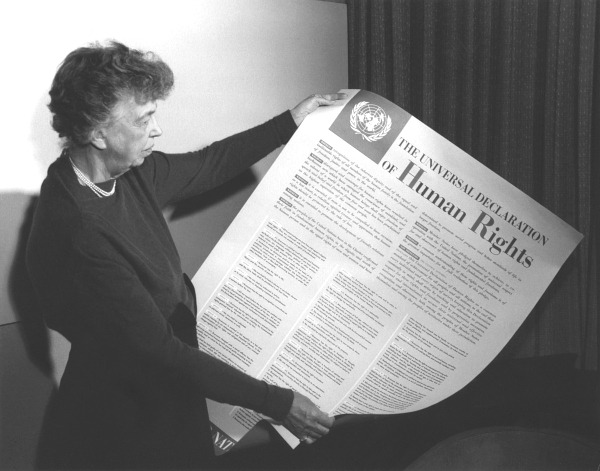
Human Rights Day is celebrated worldwide annually on December 10 to commemorate the day the UN General Assembly adopted the Universal Declaration of Human Rights (below) in 1948, this year marking the Declaration’s 75th anniversary. While the Declaration is non-binding, it proclaims fundamental rights and freedoms naming 60 human rights to which all people are entitled.
It has been translated into more than 500 languages.
Former First Lady Eleanor Roosevelt was the Chair of the UN Commission on Human Rights and oversaw the drafting of the declaration, which is widely respected as a moral measure for the just and fair treatment of every human being.
Human Rights Day is a reminder to reaffirm that every person is created equal and endowed with inalienable rights regardless of race, color, religion, sex, language, politics, origin, social status or sexual orientation. It is a reminder to renew our commitment to uphold human rights across the world.
“Tolerance implies no lack of commitment to one’s own beliefs,” John F. Kennedy said. “Rather it condemns the oppression or persecution of others.”
Across the world, as many people are suffering human rights abuses, affected by poverty and war, and lacking basic fundamental human rights, we can make progress toward a more just and equitable world by raising awareness and standing up for human equality and dignity.
Eleanor Roosevelt dedicated her life working tirelessly to fulfill a vision of human rights for all people to live in a peaceful world and called the Universal Declaration of Human Rights her most important task. She shared her vision with the world as a challenge for people to choose how we treat one another and a call to action:
“Surely, in the light of history, it is more intelligent to hope rather than to fear, to try rather than not to try,” she said. “For one thing, we know beyond all doubt: Nothing has ever been achieved by the person who says, ‘It can’t be done.’”
It isn’t enough to talk about peace. One must believe in it. And it isn’t enough to believe in it. One must work at it.
“Where, after all, do universal human rights begin?” Eleanor said. “In small places, close to home – so close and so small that they cannot be seen on any maps of the world. Yet they are the world of the individual person; the neighborhood he lives in; the school or college he attends; the factory, farm or office where he works. Such are the places where every man, woman and child seek equal justice, equal opportunity, equal dignity without discrimination. Unless these rights have meaning there, they have little meaning anywhere. Without concerned citizen action to uphold them close to home, we shall look in vain for progress in the larger world. The future belongs to those who believe in the beauty of their dreams.”
For more information visit www.un.org.
